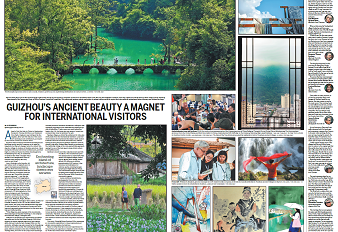Goose feathers supply shuttlecocks for SW China factory

A farmer herds geese at a breeding base in Jinping county in April 2021. [Photo by Yang Xiaohai/For China Daily]
Yang Haixiang, a 54-year-old goose farmer from Jinping county, Guizhou province in Southwest China, has discovered that the poultry has laid "golden eggs" with their feathers.
"Goose farming used to supply restaurants and food processing factories. Now their feathers turn out to have a lot of value by being made into shuttlecocks," said Yang. The goose farm Yang has worked at has been a supplier for the world-leading shuttlecock factory in the county.
The RSL factory in Jinping manufactures about 3 million shuttlecocks a month, making the county the world's largest shuttlecock production base, said the company.
"One out of 10 shuttlecocks used on courts worldwide is produced here in Jinping," said Hu Bing, general manager of the RSL factory in Guizhou.
RSL, which used to be a British brand and is now a Hong Kong-based badminton equipment provider, has four manufacturing locations in the Chinese mainland to meet rising demand for the popular sport worldwide. The factory in Jinping, a less-developed county in Guizhou province, has developed businesses ranging from shuttlecock production to feather processing and feather purchasing.
On expanding their production lines to Guizhou province, Hu said: "Shuttlecock manufacturing is mainly labor-intensive. When the recruitment of workers in the nation's coastal provinces had become increasingly challenging, we shifted part of our production to mountainous regions where workers are abundant and costs are lower. "
To capture the business opportunities, the Jinping county government introduced geese from Jiangsu province and began large-scale manufacturing in 2017, offering goose feather supplies to the shuttlecock production chains.
The county has 21 goose farms, producing 3 million geese annually. The goose production chain in the county has reached a value of more than 1 billion yuan ($157 million).
Qu Qiuhua, who is in her 40s and one of the first group of recruits in the factory, has operated eight production machines, testing nearly 20,000 feathers for the shuttlecocks.
With a monthly salary of 3,500 yuan, Qu, who had returned from working at a leather bag factory in Dongguan, Guangdong province, said she likes being close to her hometown and family.

An RSL employee works on a shuttlecock production line in Jinping county, Guizhou province, in September. [Photo by Yang Xiaohai/For China Daily]
The RSL factory produces 36 million shuttlecocks annually, selling them to more than 60 countries and regions including Japan, the United Kingdom and Germany, with an annual production value reaching 150 million yuan.
Hu said the local government has built a factory of 40,000 square meters for their support, which has offered the space rent-free for the first three and a half years.
With production and revenue on the rise in recent years and thanks to the growing awareness of keeping fit among the Chinese consumers, Hu said they are planning to invest 150 million yuan to acquire the factory and to raise the production volume even higher each month.
Meanwhile, Hu said the factory has joined the local government to cultivate badminton in the county by building more badminton courts and providing equipment while setting up matches to invite more local residents to develop an interest in playing badminton.
According to Insight and Info's report on the badminton sector, about 250 million people have participated in badminton, with an annual growth rate of 6.25 percent in 2019, reaching a market value of 34.8 billion yuan.
He Zhiliang, a manager at the Guangzhou office of RSL, said the company's sales during the Singles Day shopping festival last November exceeded 1 million dozen, up about 20 percent year-on-year. The company, owned by the DTL Company in Hong Kong, has four major production plants on the Chinese mainland. They are in Jiangsu province, Guangdong province, Guizhou province and the Guangxi Zhuang autonomous region.
京ICP备13028878号-8







 Overview
Overview
 Guiyang
Guiyang
 Guian New Area
Guian New Area
 Liupanshui
Liupanshui
 Anshun
Anshun
 Qianxinan
Qianxinan
 Qiandongnan
Qiandongnan
 Qiannan
Qiannan
 Zunyi
Zunyi
 Tongren
Tongren
 Bijie
Bijie
 75 years on: Guizhou's great leap to prosperity
75 years on: Guizhou's great leap to prosperity
 China (Guizhou) Intl Alcoholic Beverages Expo
China (Guizhou) Intl Alcoholic Beverages Expo
 China Life Tips: Unlocking mobile payments
China Life Tips: Unlocking mobile payments


